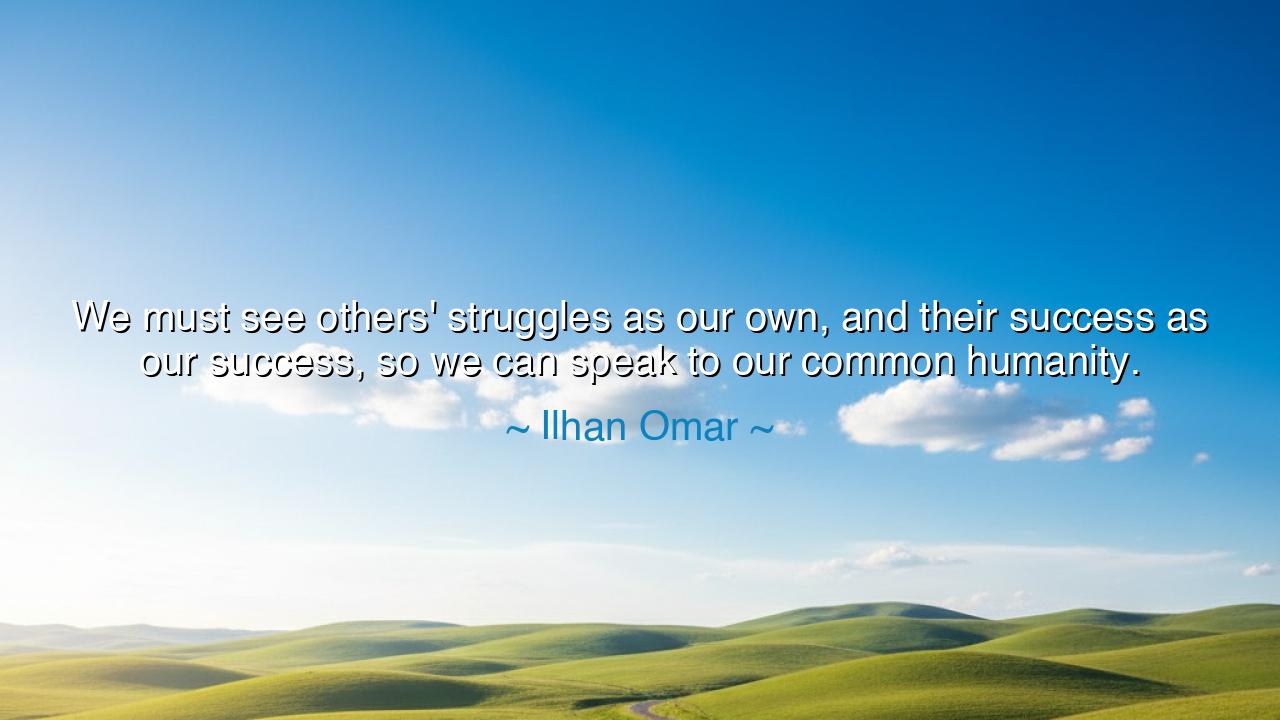
We must see others' struggles as our own, and their success as
We must see others' struggles as our own, and their success as our success, so we can speak to our common humanity.






Hear the words of Ilhan Omar, who declared: “We must see others’ struggles as our own, and their success as our success, so we can speak to our common humanity.” These words are no mere political appeal, but a timeless summons to the conscience of mankind. For she speaks of the ancient truth: that the destiny of one is bound to the destiny of all, and that no man or woman can be whole if their neighbor is broken. To recognize another’s pain as your own, to rejoice in another’s triumph as your own—that is the path not only to justice, but to peace.
When she speaks of struggles, she does not mean only the great battles of nations, but the daily trials that weigh upon every human heart. Hunger, loneliness, injustice, fear—these are burdens carried by countless souls. Yet too often, men close their eyes to the suffering of others, imagining it does not touch them. But the wisdom of Omar is clear: your neighbor’s wound is also your wound, for we are threads woven into the same fabric. Tear one thread, and the whole garment weakens. Heal one, and all are strengthened.
History reveals this truth in shining examples. Recall Dr. Martin Luther King Jr., who in his “Letter from Birmingham Jail” declared that “injustice anywhere is a threat to justice everywhere.” He lived and died upon this principle, seeing the struggles of Black Americans as inseparable from the conscience of the nation itself. His triumphs were not his alone, but belonged to all who yearned for freedom. By binding his heart to the suffering and success of others, he became the voice of a generation, calling the world to remember its common humanity.
But we see it also in moments of quiet solidarity. During the Second World War, many families in Denmark risked their lives to shelter Jewish neighbors, not because they themselves were hunted, but because they saw their neighbors’ struggle as their own. When the time came to act, they did not hesitate. By sharing in another’s suffering, they preserved dignity, honor, and life itself. Their story remains a beacon of what it means to embrace the humanity of others.
The meaning of Omar’s words is thus both heroic and practical: to thrive as one people, we must learn to celebrate one another’s success without envy, and to share in one another’s burdens without indifference. This is not weakness, but strength; not charity, but justice. For when your brother or sister rises, you too are lifted; and when they fall, you too are diminished. Only by embracing this truth can humanity stand united against the storms of division.
The lesson for us is urgent. Do not live as if you were an island, concerned only with your own gain. Lift your eyes to see the tears of those around you, and let your heart be moved. When another achieves greatness, rejoice as though it were your own. When another suffers, extend your hand as if it were your own wound. In this way, the walls between us will crumble, and the bridges of compassion will rise.
Practical steps lie before us: listen deeply to the stories of others, especially those unlike your own. Stand alongside those who are marginalized, even when their pain does not directly touch you. Celebrate loudly the victories of friends, neighbors, and even strangers, for in their joy is also your joy. Teach your children not only to succeed but to lift others as they climb. And above all, remember daily that the thread of humanity is woven through us all.
So let the words of Ilhan Omar endure: to see the struggles of others as our own, and their success as our success, is to live in truth. Only then can we speak with one voice to the world, declaring that beyond tribe, beyond nation, beyond creed, we are one people, joined by a common humanity that cannot be broken.






AAdministratorAdministrator
Welcome, honored guests. Please leave a comment, we will respond soon